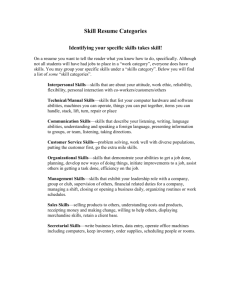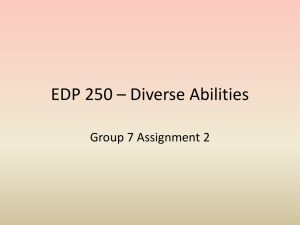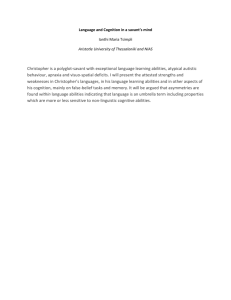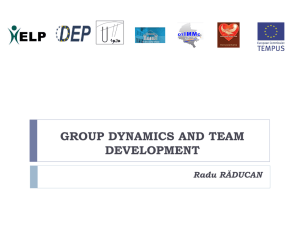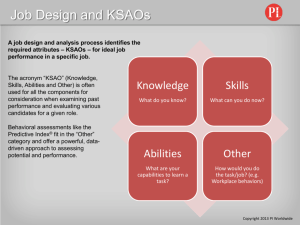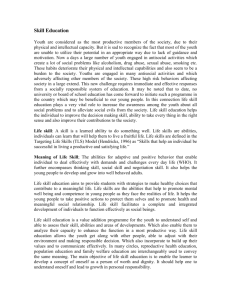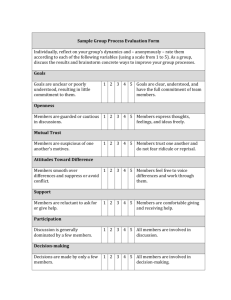The Critical Skills Students Need
advertisement
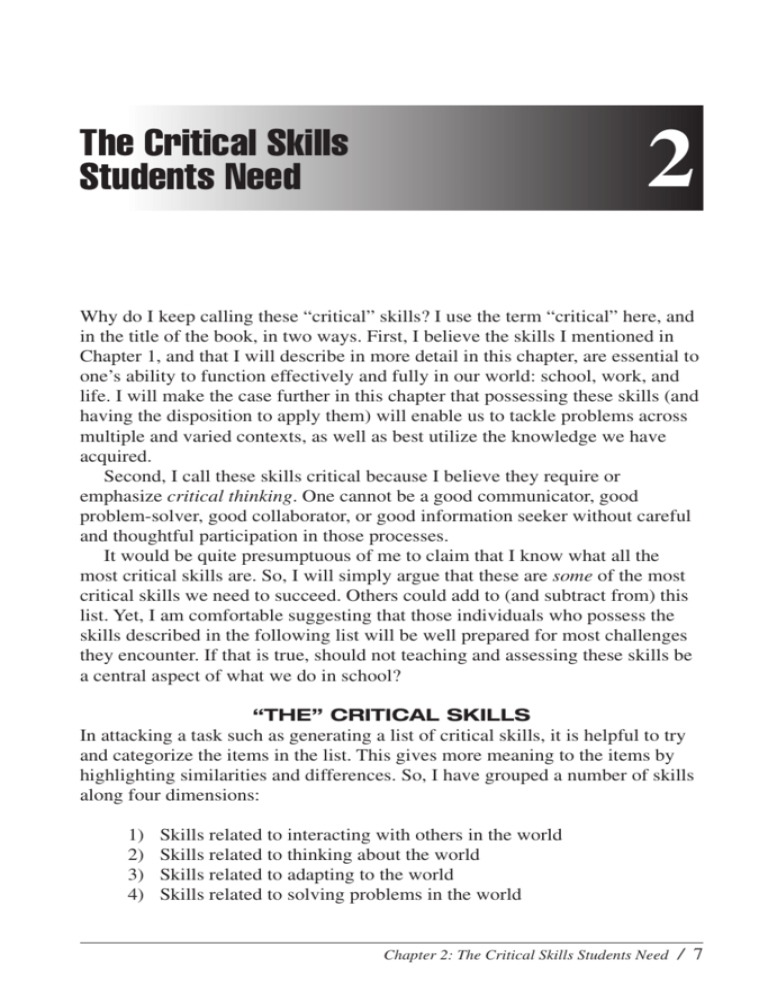
2 The Critical Skills Students Need Why do I keep calling these “critical” skills? I use the term “critical” here, and in the title of the book, in two ways. First, I believe the skills I mentioned in Chapter 1, and that I will describe in more detail in this chapter, are essential to one’s ability to function effectively and fully in our world: school, work, and life. I will make the case further in this chapter that possessing these skills (and having the disposition to apply them) will enable us to tackle problems across multiple and varied contexts, as well as best utilize the knowledge we have acquired. Second, I call these skills critical because I believe they require or emphasize critical thinking. One cannot be a good communicator, good problem-solver, good collaborator, or good information seeker without careful and thoughtful participation in those processes. It would be quite presumptuous of me to claim that I know what all the most critical skills are. So, I will simply argue that these are some of the most critical skills we need to succeed. Others could add to (and subtract from) this list. Yet, I am comfortable suggesting that those individuals who possess the skills described in the following list will be well prepared for most challenges they encounter. If that is true, should not teaching and assessing these skills be a central aspect of what we do in school? “THE” CRITICAL SKILLS In attacking a task such as generating a list of critical skills, it is helpful to try and categorize the items in the list. This gives more meaning to the items by highlighting similarities and differences. So, I have grouped a number of skills along four dimensions: 1) 2) 3) 4) Skills related to interacting with others in the world Skills related to thinking about the world Skills related to adapting to the world Skills related to solving problems in the world Chapter 2: The Critical Skills Students Need / INTERACTING WITH OTHERS Since we are a social species, effectively interacting with other humans is often critical to our success. Thus, it is quite beneficial to be competent at: • Communication Skills—including the abilities to read, write, speak, and listen in a particular language as well as in other common languages; express oneself through and interpret nonverbal communication; communicate through and interpret artistic expression • Collaborative Skills—including the abilities to contribute to group activities and discussions; consider the ideas and perspectives of others; include others in the collaborative process; stay focused on the task; provide and receive feedback constructively • Leadership Skills—including the abilities to model appropriate behavior; direct and organize the behavior of others; persuade others; manage conflict; take action and accept responsibility for the consequences • Interpersonal Skills—including the abilities to take the perspective of others; manage conflict; manage one’s emotions and impulses across a variety of interpersonal situations; maintain positive relations with others; adhere to appropriate boundaries when interacting with others MAKING SENSE OF THE WORLD Also, part of human nature is our capacity to reason and reflect upon the decisions and problems we encounter. Thus, the cognitive processes that often direct our behavior are also critical to our success. Such skills include: • Logic or Reasoning Skills—including the abilities to draw appropriate inferences; deduce logical conclusions; identify assumptions; generate predictions; recognize faulty logic • Quantitative Reasoning Skills—including the abilities to estimate; exhibit a sense of scale; interpret quantitative data in varied formats; use quantitative data to support arguments; interpret probabilities; recognize misuses of data • Analytical Skills—including the abilities to identify patterns; identify the components of a concept or problem; identify appropriate criteria for judging a product or idea; compare and contrast concepts or processes; classify or organize elements along specified criteria • Evaluation Skills—including the abilities to evaluate the validity of claims; evaluate the relevance of different types and sources of evidence for different types of claims or questions; evaluate the sufficiency of evidence to draw a conclusion; apply criteria to the judgment of a product or idea; identify possible errors and biases in / Assessing Critical Skills claims or conclusions • Integration Skills—including the abilities to find connections between similar and dissimilar concepts or processes; combine disparate ideas into a new, coherent idea; synthesize a variety of components into a new product PERSONAL GROWTH AND DEVELOPMENT With such a plastic brain, humans have considerable capacity to adapt to the environment. The more we learn from our successes and failures and learn how to adjust accordingly the more successful we tend to be. That places considerable importance upon the following skills: • Self-assessment Skills—including the abilities to apply relevant criteria to own work; identify strengths and weaknesses; judge when one has successfully completed a task • Goal-setting Skills—including the abilities to identify clear goals; identify realistic goals; identify goals relevant to the task; identify effective responses to positive and negative outcomes • Self-management Skills—including the abilities to manage one’s time; be prepared; develop and follow successful routines; organize and plan appropriately; prioritize; respond flexibly to new situations; manage stress and handle distractions; act independently when necessary or appropriate • Metacognitive Skills—including the abilities to monitor one’s progress on a task; assess task difficulty; anticipate likelihood of difficulty on a task; acknowledge one’s strengths and limitations; evaluate effectiveness of current and alternative strategies; recognize when a change in approach is needed and make adjustments; identify errors; take control of learning • Study (or Learning) Skills—including the abilities to manage time for a task or situation; recognize the best strategies for certain kinds of tasks; outline or organize information to be learned; give meaning to the information to be learned; attach useful cues to the information to be learned; exhibit active engagement with information to be learned; make information personally relevant; use others wisely in service of learning of information; apply meta-memory knowledge to learning of information SOLVING PROBLEMS Virtually everything humans do can be thought of as a problem to be solved, a question to be answered, or a task to be completed. Thus, our success in life also depends upon developing skills which enhance our capacity to successfully approach, analyze, and complete tasks. Such skills include: Chapter 2: The Critical Skills Students Need / • Problem-solving Skills—including the abilities to identify a (the) problem; determine knowledge and skills necessary or helpful to solve the problem or complete the task; apply appropriate knowledge, rules and strategies to the problem; generate possible solutions; evaluate the feasibility and effectiveness of possible solutions; given relevant constraints, determine best possible solution(s) • Information Literacy Skills—including the abilities to identify or frame a question to be answered; locate appropriate sources of information that address the question; access the information from a variety of sources; evaluate the accuracy, relevancy, authority, and currency of the information for the question; determine when sufficient information has been acquired to answer the question • Creative or Innovative Skills—including the abilities to identify novel connections between disparate concepts and contexts; identify novel approaches to a process or task; combine disparate concepts, processes or tools in novel ways • Technical Skills—including the abilities to recognize appropriate tool(s) for specific tasks; contribute to the completion of a task through effective application of tools Note: I have not listed dispositions or habits of mind among these critical skills. Yet, research finds that those are critical as well. Someone might possess good critical-thinking skills, but if she is not disposed to applying them in certain situations or in general those skills are not employed (Bensley, 2006; Perkins, Jay, & Tishman, 1993). However, to keep attention here on how to develop these skills, that discussion will be left to others. Okay, take a look at the list of skills. Obviously, these skills overlap considerably within and between the categories. Also, one could choose a variety of names that capture their focus, but this categorization helps elucidate the relevance and importance of these skills. Given that, what do you see when you look at the list? When scanning the list and imagining a student employing most or even many of these skills, can you understand a teacher’s enthusiasm for working with such a student? When you imagine an employee (or supervisor) or colleague or neighbor or leader with such skills do you see great promise for such a person in any sphere of life? These are skills we can teach, beginning at an early age. We just are not doing it now, at least not systematically and not for most students. 10 / Assessing Critical Skills BEYOND READING, ’RITING, AND ’RITHMETIC A few critical skills, such as reading and writing, do receive considerable attention in our schools. Yet, even there, in part because of our overstuffed curricula, many students do not receive sufficient instruction and practice in how to read the variety of nonfiction texts they will encounter in school and beyond. Similarly, too many students graduate high school with weak communication skills. Other critical skills, such as • information literacy skills • metacognitive strategies • problem-solving skills • collaborative skills receive far less attention, particularly relative to the frequency with which we are called upon to use them in numerous contexts. I am not referring to discipline-specific skills—how to conduct scientific inquiry, how to multiply fractions, or how to converse in another language. Many of those are important as well. Rather, I am arguing for greater attention to those skills that cross all disciplines and thus do not belong to any one discipline. Given that most of these skills do not have a particular disciplinary home, they often receive much less attention even though they are often applied across a much greater range of contexts. To explore these critical skills further, let us examine their relevance to school, work, and life. Copyright 2009 Linworth Publishing, Inc. Chapter 2: The Critical Skills Students Need / 11
